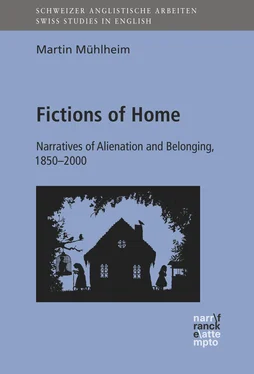Such an austere account of the genregenre fits well with Eliot’s The Mill on the Floss , for the novel’s heroine, Maggie, undoubtedly fails to harmoniously fuse her own desires with the demands and imperatives of her family and society at large. Even when Maggie is still a child, her relativesrelatives express misgivings and disapproval: Mr. Tulliver fears that his daughter is “[t]oo ’cute [i.e. acute, clever]” for a woman, and his wife bemoans both Maggie’s unruly behavior and her brown skin, which “makes her look like a mulatter” (12; bk. 1, ch. 2). Aunt Pullet similarly frowns at her niece’s dark complexion, suspecting that looking “like a gypsy” will stand in Maggie’s way later in her life (58; bk. 1, ch. 7). Deborah Epstein NordNord, Deborah Epstein rightly notes that Maggie’s relatives thus conflate her “anomalous femininityfemininity” with a sense of racial otherness (103), and to some extent this explains why, after a particularly severe scolding, little Maggie decides to run away and join a group of gypsiesgypsies – an act that she sees as “the only way of escaping opprobrium, and being entirely in harmonyharmony with circumstances” (88; bk. 1, ch. 11). The episode thus constitutes a variant of the Freudian family romancefamily romance:
[This alternate version] involves the fantasyfantasy not of social aggrandizement and aspiration, but of lowly or stigmatized birth. The desiredesire to rival and defeat the parent can also express itself as the wish to escapeescape from the bonds of obedience and conformityconformism and conformity through the discovery of a secret non-English, non-white (to the extent that EnglishnessEnglishness is defined as white) selfself. (NordNord, Deborah Epstein 12)
Feeling constricted and unhappy at home, in short, little Maggie makes a desperate attempt to venture out and find her place in the world.
Accordingly, Maggie’s flight to the gypsiesgypsies is more than merely a semi-comical episode about childish fantasies and youthful sorrows. Rather, given the symbolicalsymbolical status of Romani in 19th-century British culture, we must see Maggie’s attempt to associate with gypsies as decidedly ominous. Deborah Epstein NordNord, Deborah Epstein has shown that, for many nineteenth-century writers (including George Eliot), gypsies symbolized the absenceabsence of a clearly defined homelandhomeland and therefore the lack of a “propitious future” (7). More generally, C.A. BaylyBayly, C.A. describes the nineteenth century as a period that saw a worldwide onslaught on nomadic forms of life – both in colonialcolonialism territories and in long-established, independent states (BaylyBayly, C.A. 436–440; see also Maier 30). The British governmentgovernment in IndiaIndia, for example, idealizedidealization the settled (and tax-paying) peasant and, in 1871, introduced the Criminal Tribes Act in order to increase its controlcontrol over itinerant and nomadic groups (Kerr 100; OsterhammelOsterhammel, Jürgen 225). Maggie’s dark hair and her attempt to find a new home amongst the ‘unsettled’ gypsies thus associate her with a people that, for Eliot’s contemporaries, tended to symbolize backwardness, dispossession, and ruin. The link between Maggie and gypsies can thus be seen as having the same function as her mother’s repeatedly expressed fears that Maggie’s wild nature will one day lead her to drown (e.g. 12 and 87; bk. 1, ch. 2 and ch. 10): foreshadowing that the novel must end in disaster, and that Maggie will fail to find a true home in the world.
To a large extent, the conflictconflict that leads to Maggie’s failure revolves around her relationship with her brother Tom. As a little girl, Maggie once says that she loves Tom “better than anybody in the world” (27; bk. 1, ch. 4), and she later tries to explain the well-nigh incestuousincest intensity of her attachment by the fact that her earliest memory is the image of Tom and herself standing hand in hand by the river Floss (249; bk. 1, ch. 1). At the same time, it is evident early on in the novel that Tom’s clear-cut, rigid view of what is right and what is wrong conflicts sharply with Maggie’s impulsiveness and intellectual curiosity. Nevertheless, as long as they are childrenchildren they manage to avoid estrangementestrangement even when Tom’s righteousness erupts into anger, for “Maggie and Tom were still very much like young animals, and so she could rub her cheek against his, and kiss his ear in a random, sobbing way, and there were tender fibres in the lad that had been used to answer to Maggie’s fondling” (34; bk. 1, ch. 6). If childhoodchildhood is at one point compared to EdenEden, Garden of in Eliot’s novel (155 and 159; bk. 2, ch. 7), then this is not because it is entirely free of conflict, but because it still holds the promise of forgivenessforgiveness for Maggie.
However, it is precisely the abrupt and brutal nature in which childhoodchildhood ends for Maggie and Tom that also destroys this bond of forgivenessforgiveness. When their father loses a lawsuit over propertyproperty rights (concerning irrigation works and the legitimate share of waterwater power: 129; bk. 2, ch. 2), the proud man and his family suddenly find themselves bankrupt. Soon, many of the Tullivers’ most cherished belongings are to be put up at auction, and it is this traumatic experience of dispossession that propels Maggie and Tom into the adult world of “remembered cares” (159; bk. 2, ch. 7). John Wakem, the lawyerlawyers who defeated Mr. Tulliver in court and whom the miller regards as evilevil incarnate, eventually buys the Tullivers’ old mill. Wakem, relishing the opportunity to humiliate the old owner under the guise of a “benevolent action” (208; bk. 3, ch. 7), offers Mr. Tulliver the opportunity to stay on as manager of the mill – and thus as a dependent of the very man he loathes: “one o’ them fine gentlemen as get money by doing business for poorer folks, and when he’s made beggars of ’em he’ll give ’em charity” (220; bk. 3, ch. 9). Formerly a version of the independent, land-owning English yeoman, Mr. Tulliver is now reduced to being a mere employee, and he never fully recovers from the blow.103 In consequence, the responsibilityresponsibility to earn enough money to restore the lost home to the family falls almost entirely to Tom, who is at the time only sixteen years old. Mr. Tulliver, however, also urges Tom to write in the family bibleBible and biblical motifs that he will never forgive Wakem for what he has done to his father. It is a command that Tom executes “with gloomy submission” (220; bk. 3, ch. 9), and which expels him forever from the realm of forgiveness that he had shared with his sister before the sudden end of their childhood.
Maggie herself, meanwhile, is not only dismayed by her father’s hatredhate and hatred of Wakem, but also suffers from the new “dreariness of a home where the morning brings no promise with it” (163; bk. 3, ch. 1). The family’s material dispossession exacerbates Maggie’s sense of spiritual unbelonging – a link that the novel symbolically highlights through the forced sale of her ‘spiritual capital’: her beloved booksbooks (197; bk. 3, ch. 6). At the same time, we saw in the discussion of Captain Ahab and Pip in chapter one that recognition of shared sufferingsuffering may foster a feeling of mutual belonging. And indeed, Maggie finds a precarious sense of being at home in the presence of a fellow sufferer. Philip, lawyerlawyers Wakem’s sensitive son – whom Maggie first met when he was Tom’s schoolfellow in happier days – has a hump because of “an accident in infancy” (134; bk. 2, ch. 3). As a consequence Philip feels that he is an outcast with no one to “tell everything – no one who cares enough” (246; bk. 5, ch. 1). Earlier in the novel, Eliot’s narrator suggests that “the gift of sorrow” is that it may serve to strengthen the “bond of human fellowship” (159; bk. 2, ch. 7), and when Maggie meets Philip again she finds herself responding to his pain. Admittedly, at first she is hesitant to accept Philip’s offer of friendshipfriendship, knowing that she would have to keep it a secret because both her father and Tom would forbid any association with the Wakem family. However, deciding that there is “such a thing as futile sacrificesacrifice for one to the injury of another” (247; bk. 5; ch. 1), Maggie ultimately agrees to meet Philip again. With each new meeting their friendship deepens, and in time Maggie even accepts Philip’s professions of lovelove, despite the fact that she remains uncertain as to the true nature of her feelings towards him (271–274; bk. 5, ch. 5).
Читать дальше












